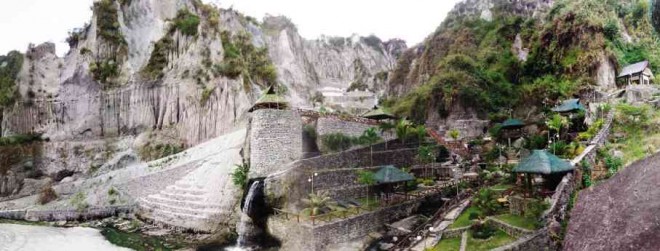
PUNING is a resort developed right smack on Mt. Pinatubo’s lahar field, which can be reached via Barangay Sapang Bato in Angeles City. PHOTOS BY E.I. REYMOND OREJAS / CONTRIBUTOR
TWO VOLCANOES—one inactive, the other erupted 24 years ago after 600 years of silence—stand across each other in the middle of Central Luzon in Pampanga but they are a study in contrast.
Mt. Arayat to the east, toward Nueva Ecija, gurgles cool spring water while Mt. Pinatubo, to the west toward Zambales, lets out soothing hot spring water.
Both spell summer fun and adventure.
At the foothills of the Mt. Arayat National Park in Barangay (village) Lacquios in Arayat town, springs feed three swimming pools at the 14-hectare recreation site.
Entrance here goes between P50 and P90 per person since this was reopened in November 2014 by the Arayat local government led by Mayor Bonifacio Emmanuel Alejandrino.
The 3,715-ha park, established by Commonwealth President Manuel L. Quezon in 1933, remains under the management of the Department of Environment and Natural Resources (DENR).
Alejandrino, a former communist rebel commander, beautified the park at a cost of P12 million so it can generate revenue for the local government and to provide jobs and livelihood to residents.
A regular summer destination for the masses, the recreation site was closed in 2009 to house some 200 families displaced by the landslides that occurred at the upper slopes.
Mt. Arayat, towering at 1,026 meters, has a 100-step stairway leading to a biking trail and view deck.
The three pools are of various sizes, including one for children. The largest pool was built using funds generated from quarry operations. All three pools drain to a large lake kept clean by soldiers belonging to the Army’s 703rd Infantry Brigade. The water ends up in nearby farms. Surrounded by trees, the lake is ideal for fishing.
Overnight stays are possible, with several huts and air-conditioned rooms for rent.
Rizalistas’ compound
It’s quiet far down the village, in the gated compound of Rizalistas or followers of the national hero, Dr. Jose Rizal. They don’t usually turn away visitors during prayer time.
Via the North Luzon Expressway, visitors must take the San Fernando toll gate and head to Arayat. They can turn left at the
intersection leading to Cabiao town in Nueva Ecija. From the Maharlika Highway, they can catch a bus in Gapan City and head to Arayat, stop at the intersection a little past Cabiao.
The 11 hot springs in Sitio Puning were carved out at the foothills of Mt. Pinatubo in Barangay Inararo in Porac town. It is easily accessed via Sitio Target in Barangay Sapang Bato in Angeles City.
Day tours by the Puning Hot Spring and Restaurant cost P3,000 for three persons. The enterprise, developed by the Department of Tourism in Central Luzon in 2004, is operated by a Korean businessman married to a Filipina and employs Aetas.
The P3,000 is inclusive of food, use of an off-road vehicle, hot sand steam, whole body mudpack, local guide, cottage, and barangay entrance and conservation fees.
The dip in mildly hot water is guaranteed to soothe one’s tired muscles. The laharscape (hardened volcanic materials in forms of walls and meandering rivers) enthralls visitors. Korean and Japanese tourists frequent the place.
Visitors planning to go to Sitio Puning must enter the Clark Freeport and turn left at the corner of PhilExcel to get to the Sapang Bato gate. Once there, they must turn right to reach Sitio Inararo.
Food and rest
In Magalang town, authentic Kapampangan meals are served at Abe’s Farm, vegetarian dishes at Orissa Garden of Wellness and home-cooked meals at Gintung Pakpak. Spas are available at Abe’s Farm and Orissa.
By taking the Magalang-Angeles City Road, visitors can make brief stops at the Museo ning Angeles and Center for Kapampangan Studies.
Inside the Clark Freeport, they can make a quick tour of the Clark Museum to know the history and culture of Pampanga. While in Clark, they can tour the Nayong Pilipino or enjoy horseback riding at El Kabayo. They can also visit the zoo at Paradise Ranch at the Sacobia side of Clark.
There’s international cuisine in Angeles City’s Balibago, Fields, Don Juico Avenue and Fil-Am Friendship Highway.
From Angeles City, visitors can go to Porac for a challenging trek to the southern side of Mt. Pinatubo. An alternative to this is a wake boarding escapade at Pradera Verde in Barangay Prado Siongco in Lubao.
In Bacolor town, former capital of Pampanga and the Philippines, the San Guillermo Church was half-buried by volcanic sediments during strong lahar avalanches in 1995 up to 1997. It houses a museum and sits beside a cemetery buried by lahar.
Heritage food
Visitors can sample Kapampangan heritage food at Apag Marangle in Bacolor, Everybody’s Café in the City of San Fernando, or at Lillian Borromeo’s kitchen in Mexico town.
They can wind up the visit at St. James The Apostle Church in Betis, Guagua town. Often likened to the Sistine Chapel in Vatican City, the Betis church tells the Gospel in a visual feast.
Nearby is the woodcarving village of Sta. Ursula. The workshop of ecclesiastical artist Wilfredo Layug there is open to guests.
For assistance, contact Arwin Lingat, Pampanga provincial tourism officer, at (045) 963-01-07, actopampanga@yahoo.com and arwin_lingat13@yahoo.com.